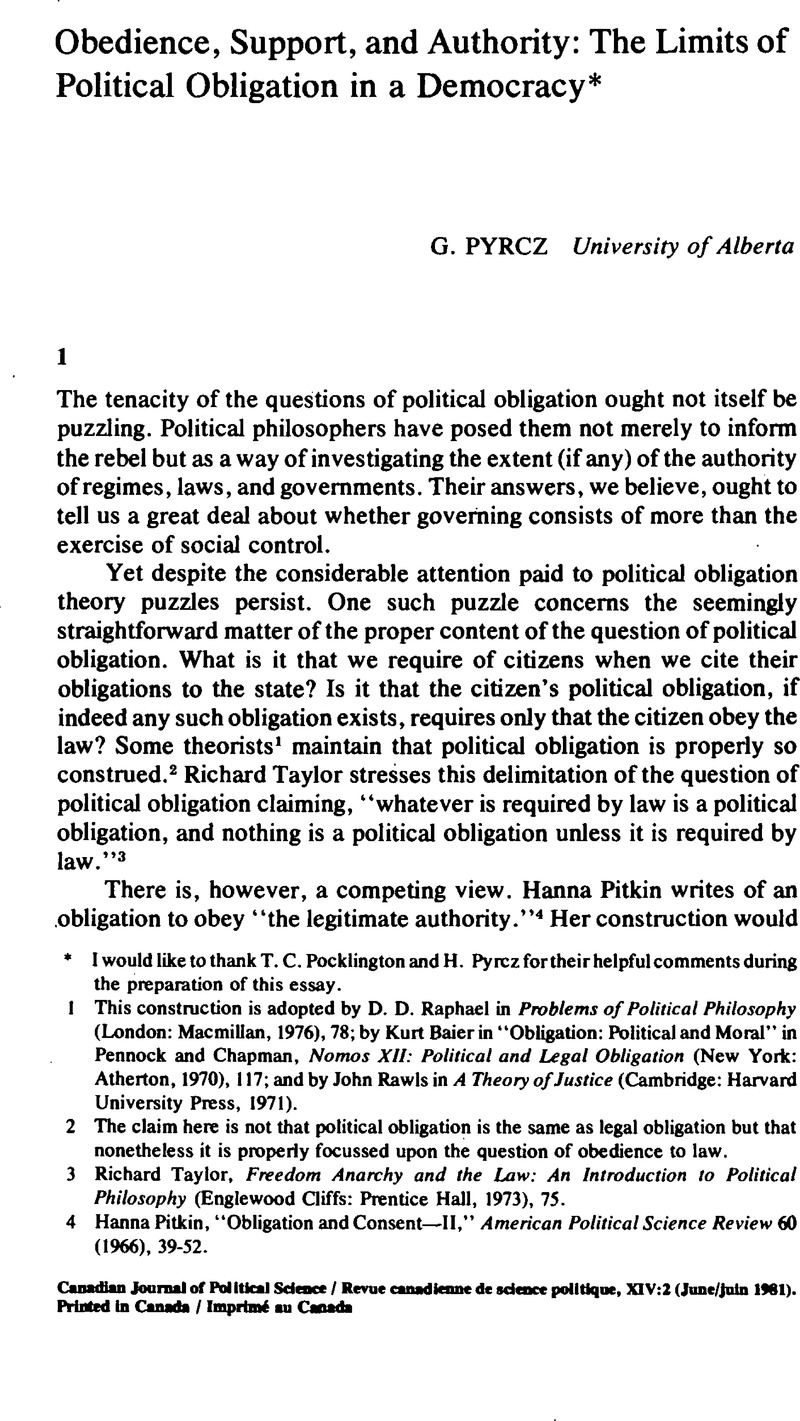Published online by Cambridge University Press: 10 November 2009

1 This construction is adopted by Raphael, D. D. in Problems of Political Philosophy (London: MacmiUan, 1976), 78Google Scholar; by Baier, Kurt in “Obligation: Political and Moral” in Pennock, and Chapman, , Nomos XII: Political and Legal Obligation (New York: Atherton, 1970), 117Google Scholar; and by Rawls, John in A Theory of Justice (Cambridge: Harvard University Press, 1971).Google Scholar
2 The claim here is not that political obligation is the same as legal obligation but that nonetheless it is properly focussed upon the question of obedience to law.
3 Taylor, Richard, Freedom Anarchy and the Law: An Introduction to Political Philosophy (Englewood Cliffs: Prentice Hall, 1973), 75.Google Scholar
4 Pitkin, Hanna, “Obligation and Consent—II,” American Political Science Review 60 (1966), 39–52.CrossRefGoogle Scholar
5 Zwiebach, Burton, Civility and Disobedience (Cambridge: Cambridge University Press, 1975), viii.Google Scholar
6 John Ladd, “Legal and Moral Obligation,” in J. Roland Pennock and John W. Chapman (eds.), Nomos XII: Political and Legal Obligation, 3–4.
7 MacPherson, Thomas, Political Obligation (London: Routledge and Kegan Paul, 1967).Google Scholar
8 J. Roland Pennock, “Introduction” in Pennock and Chapman, Political and Legal Obligation, xv.
9 Flathman, Richard, Political Obligation (New York: Atheneum, 1972), 47,Google Scholar
10 One notable exception is John Rawls (A Theory of Justice) who treats the question of a duty to support (just) governments independently from the obligation to obey the laws of such governments.
11 Most of the analysis of this essay focusses upon the liberal democratic regime. It is in these regimes that the questions 1 pose are particularly troublesome for reasons I discuss in the body of the essay. However, the problem of producing extra-legal obedience and support is one faced by all governments.
12 Wolff, Paul, The Poverty of Liberalism (Boston: Beacon Press, 1968), 76–77.Google Scholar
13 Most of the discussion of the question of civil disobedience focusses upon the appropriate conditions for the exercise of the practice, the question of punishing the civilly disobedient, the question of violence in disobedience, and the questions of direct or indirect disobedience. No theorist who has written on the subject recently, to my knowledge, has denied that civil disobedience is ever justified. Even the more conservative view of Abe Fortas (Concerning Dissent and Civil Disobedience [New York: New American Library, 1968]Google ScholarPubMed) allows disobedience as a method of challenging the constitutionality of legislation. A tidy discussion of civil disobedience theory is found in Cohen's, Marshall “Liberalism and Disobedience” (Philosophy and Public Affairs 1 [1972], 283–314).Google Scholar Of interest as well are Hugh Bedau's collection of standard essays, Civil Disobedience: Theory and Practice (New York: Pegasus, 1969)Google Scholar, Singer's, Peter, Democracy and Disobedience (Oxford: Clarendon Press, 1973)Google Scholar, and Burton Zwiebach's Civility and Disobedience.
14 Zwiebach, Civility and Disobedience, 148.
15 Hugh Bedau makes this point in introducing the concept of civil disobedience (Civil Disobedience, 18).
16 See Cohen, “Liberalism and Disobedience,” 283–84.
17 Singer, Democracy and Disobedience.
18 Friedman, Richard B., “On the Concept of Authority in Political Philosophy,” in Flathman, Richard (ed.), Concepts in Social and Political Philosophy (New York: Macmillan, 1973), 141.Google Scholar
19 Ibid.
20 Carter, April, Authority and Democracy (London: Routledge and Kegan Paul, 1979), 15.Google Scholar
21 Friedman, “On the Concept of Authority in Political Philosophy,” 41.
22 Authority, argues Hanna Arendt, is to be distinguished both from coercion by force and persuasion through argument. See Arendt, Hanna, “What is Authority” in her Between Past and Future (New York: Faber and Faber, 1963).Google Scholar In both obeying and supporting, the citizen is responding to authority if he does not make his own decision on the policy questions with which he is confronted. He may nevertheless be acting in response to authority even if he considers deeply the question of the right of governments to call for his act. Where governments gamer support exclusively by persuading the citizen that what they are calling for is good or just, no authority, in either sense, is properly seen to have been exercised.
23 Benn, Stanley, “Authority,” in The Encyclopedia of Philosophy 1 (1967), 215.Google Scholar
24 Arendt, , “What was Authority,” in Friedrich, C. J. (ed.), Nomos I: Authority (Cambridge: Harvard University Press, 1958), 81–113.Google Scholar
25 Friedrich, “Authority, Reason and Discretion,” in Nomos 1: Authority, 28–49.
26 Friedman, “On the Concept of Authority in Political Philosophy,” 127–44
27 April Carter suggests an intimate relationship between the two types of authority on this basis (Authority and Democracy, 16). Friedman maintains that the two ought be recognized as completely independent concepts (ibid., 139–40).
28 Benn, “Authority,” 216.